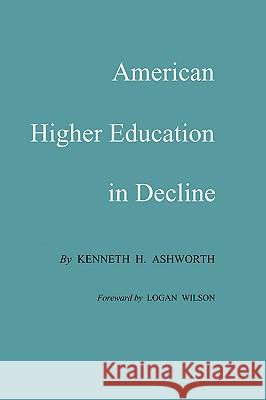American Higher Education in Decline » książka
American Higher Education in Decline
ISBN-13: 9780890969731 / Angielski / Miękka / 1979 / 108 str.
In the last twenty years America's higher-education system has jeopardized our society's very future by allowing a serious decline in educational quality. Responding to modern egalitarianism and the need to attract students, colleges and universities have initiated wildly innovative programs, noncampuses, and nontraditional degrees. Worse, they have lowered all standards. Nonacademic entrepreneurs, attracted by generous federal funds, now demand equal status with established schools. And they are dangerously near receiving this full recognition from irresolute regional accrediting associations.
From his vantage point as Texas' former Commissioner of Higher Education, Kenneth H. Ashworth sounds the alarm to all concerned administrators and teachers in American academia. He harshly criticizes the body-count game and relaxed standards, illustrating problems with vignettes from his own considerable experience. He then proposes to educators steps that would help break the cycle of declining quality. Ashworth also provocatively sketches what he sees as the next major challenge to postsecondary education: a "postindustrial" threat to the quality of academic research.
Ashworth's sober reflections are likely to provoke controversy. He makes, for example, a broad-based attack upon nontraditional and external programs, which have too often been uncritically promoted. But his well-articulated theses demand careful, even agonizing, consideration by all who care about American higher education and who, like Ashworth, believe our colleges and universities hold the key to resolving the complex and dangerous issues confronting society.











